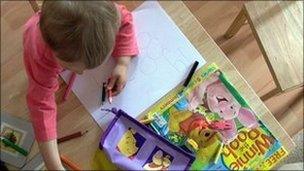Half of boys, age five, 'struggling in basics'
- Published

Boys are often slower to write than girls
More than half of five-year-old boys are struggling in the basics after a year at primary school, official figures show.
Some 53.1% of boys this age are struggling with skills such as reading and writing, and emotional and social development.
In comparison, 34.9% of girls are failing to reach this target - a gender gap of 18.2 percentage points.
The government said it was concerned boys were lagging behind girls.
The findings are based on teachers' observations of pupils.
The new Department for Education statistics show how many five-year-olds are reaching specific early learning "goals".
Alphabet troubles
These cover areas such as social skills, literacy and numeracy, and how many are reaching enough of the goals to be classed as making a "good level of development".
The figures reveal that one in six (15.1%) boys could not write their own name by the age of five, compared to just 6.9% of girls.
Some 9.6% of boys could not say the letters of the alphabet, compared with 5.5% of girls, the data shows.
And 9% of boys could not do simple adding up by the age of five, while for girls that figure was 6.1%.
The data also reveals that poorer pupils, particularly poor boys, are falling behind their richer classmates.
A quarter (24.9%) of poor boys could not write their own name, compared to 12.9% of poor girls, while 16.2% of poor boys could not say the letters of the alphabet.
For poor girls, this figure was 9.7%.
Social status
The figures also reveal that 2.2% of poor boys and 1% of poor girls could not dress themselves at the age of five.
A spokesman for the Department for Education said: "It's good news that the number of young children reaching a good level of development has increased this year, and the professionals working hard to help raise standards in the early years should feel proud of their work.
"But there are still too many children starting school without the solid foundation they need to succeed. In particular, we're concerned that boys continue to lag behind girls even before they start school, especially in writing.
"Every child, regardless of gender, background or social status, should get the right help and support in the crucial early years of their lives so they can thrive at school."
- Published22 November 2010
- Published11 November 2010